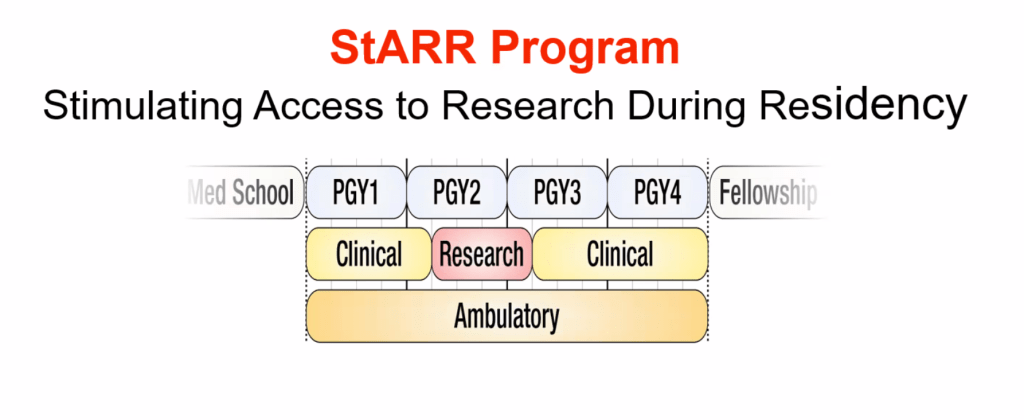Training programs at Iowa have always promised flexibility, offering opportunities to tailor specifics in order to meet long-term career goals. Now, with the receipt of a four-year, $1.3M R38 grant from the NIH’s National Heart, Lung and Blood Institute (NHLBI), trainees in the Departments of Internal Medicine and of Pediatrics have access to a new program for developing their research experience. The R38, also known as the Stimulating Access to Research in Residency (StARR), funds the training of residents who want a relatively short-term immersion in research.
David Stoltz, MD, PhD, directs the UI’s Physician-Scientist Training Pathway (PSTP). He and Paul McCray, professor in Pulmonary Medicine and of Microbiology and Immunology, will co-direct the StARR program at Iowa. Until now, the PSTP and the similar Medical Scientist Training Program (MSTP) have been the chief avenues for training physician-scientists. These programs are also predominantly meant for MD-PhD candidates, individuals who have committed to developing their clinical skills at equal pace with their research skills with the degrees to match.
For years, McCray said, a number of medical specialties have seen a decrease in the number of physician-scientists emerging from training programs. “The StARR program provides another resource for attracting new trainees into this important field.”
Interns often enter their residencies with limited exposure to research while in medical school. The StARR program, Stoltz explained, offers residents who are interested in research a chance to immerse themselves in a research experience. Although residents in any program are exposed to research and required to complete related projects, Stoltz said, “that exposure usually amounts to about three months scattered throughout their three years.” StARR scholars, on the other hand, will spend the majority of what would have been their second year of residency away from clinical responsibilities instead entirely focused on research.
Under the current “X+Y” schedule in the internal medicine residency, StARR scholars will still do their “Y-week” to continue some clinical work and training, still attend their continuity-of-care clinic, and participate in other educational activities such as ultrasound training.

The rest of their time will be spent on a focused research project in almost any subspecialty they choose. “Because it’s an NHLBI-sponsored grant,” Stoltz said, “their mentor and project should be related to cardiology, pulmonary, sleep, or hematology.” But, he acknowledges, those connections can be reasonably loose. “There are fifteen-plus NHLBI-funded researchers between Internal Medicine and Pediatrics. Finding a mentor won’t be a problem for them.”
In addition to whichever projects the participants work on, they will also be invited to attend the same conferences, Grand Rounds, and journal clubs that members of the PSTP also attend. This will add to the immersive experience that Stoltz and McCray hope to provide the program members. By the end of the year, members will have produced some kind of scholarly record—abstracts, presentations at regional or national society meetings, and manuscripts—and have developed a research skill set.
Completion of the StARR program also confers some long-term benefits. Scholars will meet with a mentoring team that includes Stoltz, McCray, their chosen mentor, and others, all of whom will help guide their development. Most likely those relationships will persist well past the end of their year. Graduates are also eligible to apply for K38 grants, an early stage mentored career development grant, to be used during fellowship. “Scholars will also be really competitive for fellowship programs in general,” Stoltz said. “There are not many of these programs out there.”
In fact, fewer than 20 programs nationwide offer the StARR program. Other participating academic medical centers include Massachusetts General Hospital, University of California San Francisco, Vanderbilt University, and University of Pennsylvania. Executive Dean of the Carver College of Medicine Patricia Winokur, MD, sees the launch of this program at Iowa as part of a long tradition. She credits Stoltz and McCray’s successful application to the “collaborative environment” and access of trainees to a diverse array of scientists ready to mentor. “Often times,” she said, “these multidisciplinary teams generate refreshing new strategies to delve into clinical problems that the trainees see during their clinical rotations.”
Recruitment for the pilot class of StARR scholars is already underway but interested interns in either the internal medicine or pediatrics residencies should reach out to Stoltz or McCray for more information. “Our hope is to identify the trainees in their residency that would like to learn more through a mentored research experience,” McCray said, “and in doing so, motivate a group of trainees to pursue this career path.”
